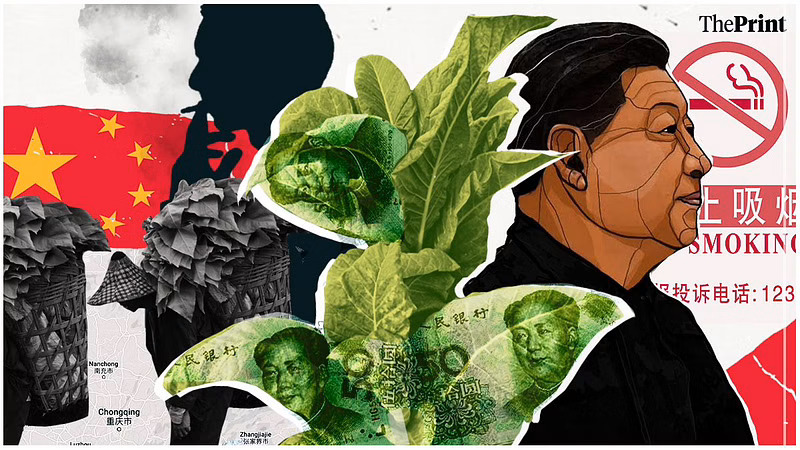
China wants to reduce smoking, but its largest revenue comes from tobacco. Solution? BRI
While China hopes to curtail domestic tobacco consumption by 2030, it also aims to control the global tobacco market in its entirety
Posted On Thursday May 5, 2022 by Bhavdeep Modi, and Originally Published on The Print

China National Tobacco Corporation, a Chinese state-owned tobacco company also known as ‘China Tobacco’ grabbed eyeballs last year after a senior disciplinary inspector was sacked by the Communist Party’s powerful Central Commission for Discipline Inspection for using ‘shadow companies’ and ‘revolving door’ to seek illegal profits. Weeks later in 2022, Sichuanese vaping baron Chu Lam Yiu was detained by China for suspected ‘disciplinary violations’ and put under ‘residential surveillance.
While these two instances can be linked to Xi Jinping’s domestic anti-graft drive since his ascension to power in 2013, an under-reported facet of China National Tobacco Corporation (CNTC) is its association with
China’s Belt & Road Initiative (BRI) and the ‘Go Out’ Policy first launched in 1999.
China Tobacco’s expansion could lead to domestic and global health implications in the form of an increase in the smuggling of tobacco, thereby undermining the nation’s commitment to international laws under the World Health Organization’s Framework Convention on Tobacco Control (FCTC). At the same time, it could also open up the possibility of Beijing acquiring influence in low-income African and Middle Eastern countries that are potential markets for CNTC and increasing the risk of Chinese soft power influence and debt traps in a similar pattern as other BRI projects around the world.
Local to global
44 per cent—this number denotes CNTC’s global market share, which trumps the West’s Big Tobacco with a $235 billion industry. With Beijing planning to reduce the rate of smoking by 20 per cent before 2030 under the Healthy China Policy, the number of smokers in China is predicted to fall. Given the fact that China Tobacco is responsible for 13 per cent of China’s entire tax revenue, Beijing surely would not want CNTC’s profits to fall.
In a bid to ‘Go Global’, China Tobacco, in 2017, reportedly laid focus on utilising BRI and Silk Road routes to expand its overseas production of tobacco and increase tobacco exports. The ultimate aim, it further stated, would be to “strive to build an international and substantive company that controls the operations and control of the entire overseas tobacco industry” (translated from Mandarin to English using Google Translate).
Therefore, it did not come as a surprise when CNTC expanded its overseas production in countries like Brazil and Zimbabwe. However, what is worrying regarding the trends of global growth of China Tobacco is the fact that it was accused of indulging in large-scale international smuggling to expand its global market, especially in Europe. According to a report, China Tobacco’s subsidiaries and global joint ventures have been involved in illegal tobacco and cigarette smuggling in countries like Italy, Libya, Ukraine, Syria, Iraq, South America and Latin America.
At the same time, China Tobacco was further accused of defying compliance with FCTC (without going into specifics), with WHO also reportedly declining to comment on China’s compliance with the international framework. To illustrate this point through a legal prism, let’s first consider Article 15 of the FCTC. It states that “the parties recognize that the elimination of all forms of illicit trade in tobacco products, including smuggling, illicit manufacturing and counterfeiting, and the development and implementation of related national law, in addition to sub-regional, regional and global agreements, are essential components of tobacco control”. China, being a part of the framework, thus, stands in complete defiance of Article 15. Moreover, as stipulated under Article 15 on the need to formulate national legislation in pursuance of this goal, State-backing to China Tobacco’s global activities seems to further contravene its framework commitments.
In this regard, it also needs to be noted here that as a result of its large tobacco imports from its subsidiaries in Brazil and Zimbabwe, the same tobacco is sure to find its way into Beijing’s domestic markets. Therefore, it is only logical to conclude that it will end up undermining China’s domestic targets set under the Healthy China Policy 2030 to reduce the rate of smoking.
Second, due consideration needs to be afforded to Article 18 of the FCTC, which states that “in carrying out their obligations under this Convention, the Parties agree to have due regard to the protection of the environment and the health of persons in relation to the environment in respect of tobacco cultivation and manufacture within their respective territories”.
According to a report, there are serious questions about China Tobacco subsidiaries complying with international labour standards in their production facilities in Brazil. The report further alleges that China Tobacco’s subsidiaries are also paying local politicians to make sure that they escape government and regulatory scrutiny. If such allegations are true, then China also stands in open defiance of Article 18 of the FCTC. Tobacco production as an agricultural activity is itself considered hazardous and such flouting of rules by China Tobacco in these countries begs a further question – is CNTC maintaining a healthy work environment in its overseas tobacco production units? Unfortunately, evidence of the same is yet not reported. Even then, it would be prudent to assume that the conditions in which tobacco labourers work will not exactly be conducive.
China Tobacco & BRI diplomacy
This begs another question – why has WHO not taken cognisance of the matter? A possible answer could be that China’s influence over WHO’s workings has helped CNTC escape liability under FCTC. Similar accusations have been previously made against China and WHO in relation to Covid-19 origins and effective information dissemination when the pandemic first broke out in Wuhan.
However, China Tobacco’s global ambitions also demand scrutiny beyond Beijing’s influence in the WHO. One of the key components of China Tobacco’s ‘Go Global’ strategy is to increase people-to-people and cultural exchanges while setting up new production facilities overseas. But this sparks concerns about China imposing its culture and language on the host countries —This has been observed in countries like Sri Lanka and Algeria, where Mandarin-only sign boards are a common sight. In fact, Tian Ze, CNTC’s subsidiary in Zimbabwe has huge adornments in the form of pictures of Mao Zedong and Xi Jinping.
Simultaneously, most Chinese state-backed corporations, while going global, witness the Chinese population moving into the host countries in large numbers. In Pakistan, there were various reports that Chinese workers working under BRI projects had indulged in physical altercations with their Pakistani counterparts in a show of dominance. Such reports once again give rise to similar suspicions regarding China Tobacco’s expansion to other countries.
Similarly, it has been reported that China Tobacco’s subsidiary in Zimbabwe has pushed local tobacco farmers into debt traps. While Chinese debt traps against countries are well-known, Individuals facing debt traps due to Beijing’s overseas activities portends a worrying sign for countries set to play host to CNTC and its subsidiaries.
Hence, China Tobacco’s planned global operations seem to be also driven by Beijing’s soft power diplomacy and influence strategies to purchase leverage in host countries. Of course, every country that will host China Tobacco’s expansion will also host a spate of other projects under BRI— and this becomes important to study given that China Tobacco’s biggest potential market will be small and low-income African and Middle Eastern countries that are more susceptible to China’s pressure tactics against their need for Chinese investments.
Even as China incorporated a ‘global health perspective’ formally under BRI in 2015, announcing plans for a Health Silk Road, China Tobacco’s expansion and defiance of local as well as international laws presents a worrying paradox. Even though observations about its expansion can be considered circumstantial and based on prediction, the similarity in patterns does paint a picture worth dwelling upon.
Bhavdeep Modi is currently serving as a Research Analyst with Global Policy Insights, a centrist-policy institute with offices in New Delhi, London and Washington. He also serves as a Consultant at the Organisation for Research on China and Asia (ORCA India). He tweets @BhavdeepModi

Bhavdeep Modi
hile serving as a Research Analyst with Global Policy Insights, Bhavdeep also serves as a Visiting Consultant with the Organisation for Research on China and Asia (ORCA India) and had been recently working as a Senior Research Associate with them. He has previously worked as a Visiting Researcher with Red Lantern Analytica (a New Delhi-based think tank) and as a Teaching Fellow with Teach for India. He has also previously worked as a political consultant for various political parties, while also having interned with Chase India, CLAWS, Office of MP Mr. Anurag Singh Thakur, and Office of MLA Mr. Ninong Ering
A lawyer by training, Bhavdeep completed his Master’s in Diplomacy, Law & Business with a specialization in Defense & National Security studies from Jindal School of International Affairs, Sonepat
Recent Articles
- James Silverman ( Founder, U&I Global) interviews Arpit Chaturvedi (Co-founder and CEO, GPI) on AGENDA 2030- DO WE WANT IT? CENTRALISATION AND THE SDG’S
- Big Tech on Section 230 – Censorship or Disregard?
- Global Policy Insights (GPI) Annual India Colloquium.
- Antitrust hearing only a beginning on accountability
- The Commonwealth: Optimising Networks & Opportunities for the 21st Century
- Population Data in the Time of a Pandemic
- The Disconnect with Ground Realities
- Models to Make Vocational Training Work in India
- Comparing Health Care Systems in England, Taiwan, and the United States
- Commonwealth In Dialogue : Academic Series
- Are we rewarding fence-sitters and free-riders by relaxing penalties on CSR law violations?
- Changing Economic Models: From Mixed Economy to Liberalization, Privatization, and Globalization in India
- Goods and Services Tax (GST) – a Seventeen Year Ordeal to a Uniform Indirect Tax Regime in India
-
Commonwealth In Dialogue: International leader Series
Podcast: Patsy Robertson, Chair Ramphall institute in conversation with Uday Nagaraju, Executive President and Neha Dewan, Fellow & Researcher about Commonwealth - Creating a future-proof curriculum for the digital age
- Commonwealth In Dialogue: High Commissioner Series": H.E Dr. Asha-Rose Migiro
- High Commissioner of the United Republic of Tanzania to the United Kingdom & Republic of Ireland in conversation with Uday Nagaraju, Executive
- Commonwealth In Dialogue: Parliamentary Speaker Series
- Louisa Wall - Marriage Equality in New Zealand
- Hon An치lu Farrugia, Speaker of the House of Representatives Parliament of Malta & Secretary General CPA Small branches speaks to Uday Nagaraju, Executive President & Co-founder of Global Policy Insights on Commonwealth, CPA Small branches and Parliament of Malta
- Commonwealth Series: Cyprus High Commissioner to the UK H.E Euripides L Evriviades interviewed by Uday Nagaraju, Executive President Global Policy Insights & Neha Dewan, Fellow & Researcher
- Global Policycast: Ex-Minister of State in the Ministry of Agriculture and Lands- Victor Cummings interviewed by Arpit Chaturvedi, C.E.O Global Policy Insights.
- Global Policycast: Ex-Minister of Youth, Paraguay- Magali Caceres interviewed by Arpit Chaturvedi, C.E.O Global Policy Insights.
- Commonwealth Series: CPA Secretary-General Akbar Khan interviewed by Uday Nagaraju, Executive President Global Policy Insights & Divya Pamulaparthy
- The Perils of Decentralization and other Buzzwords in Governance and Policymaking
